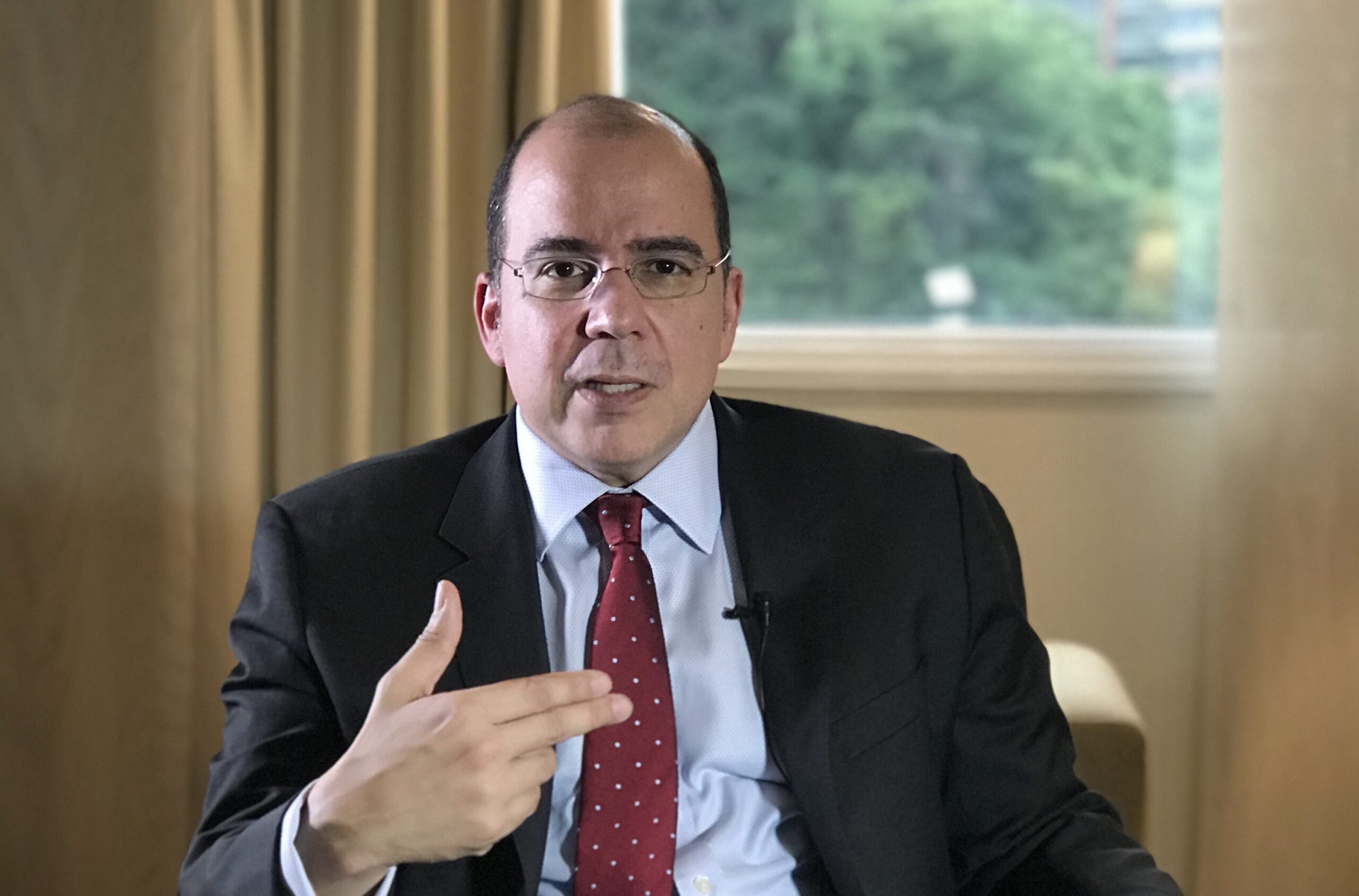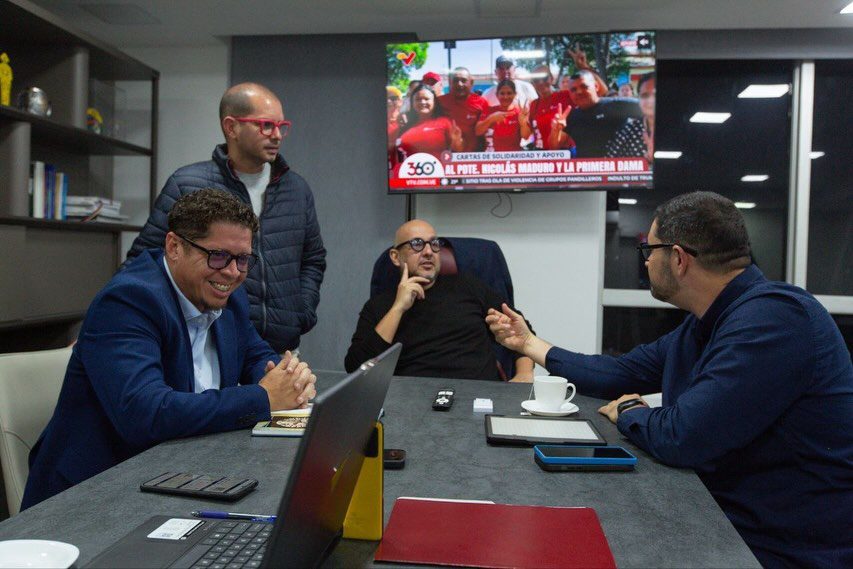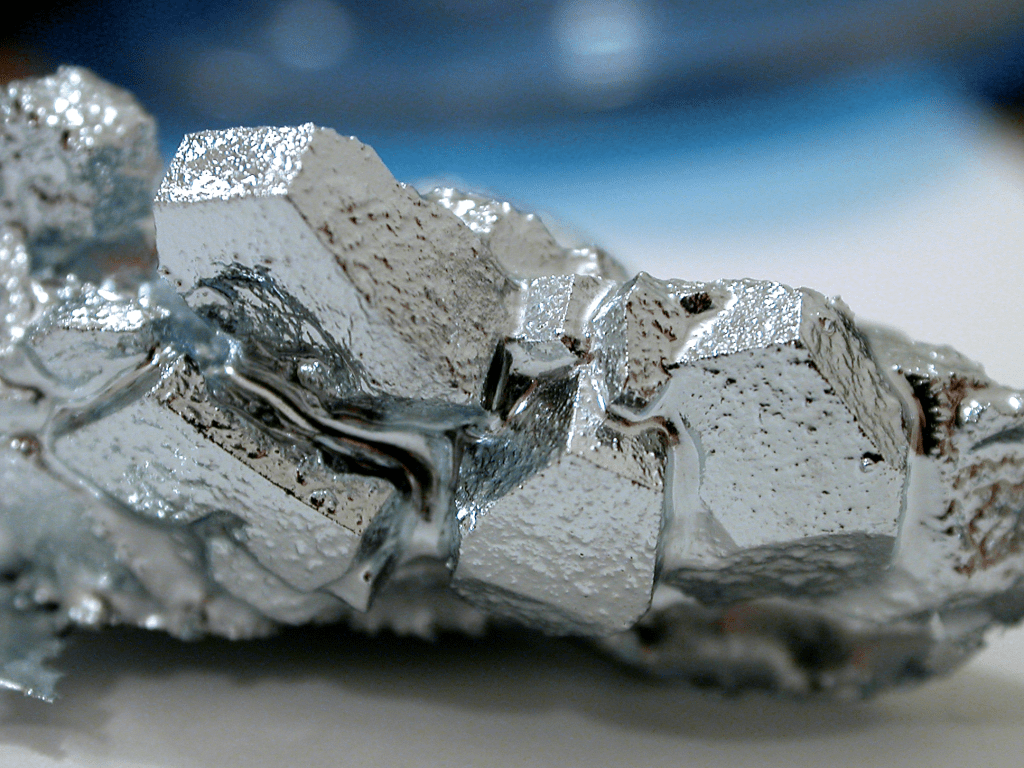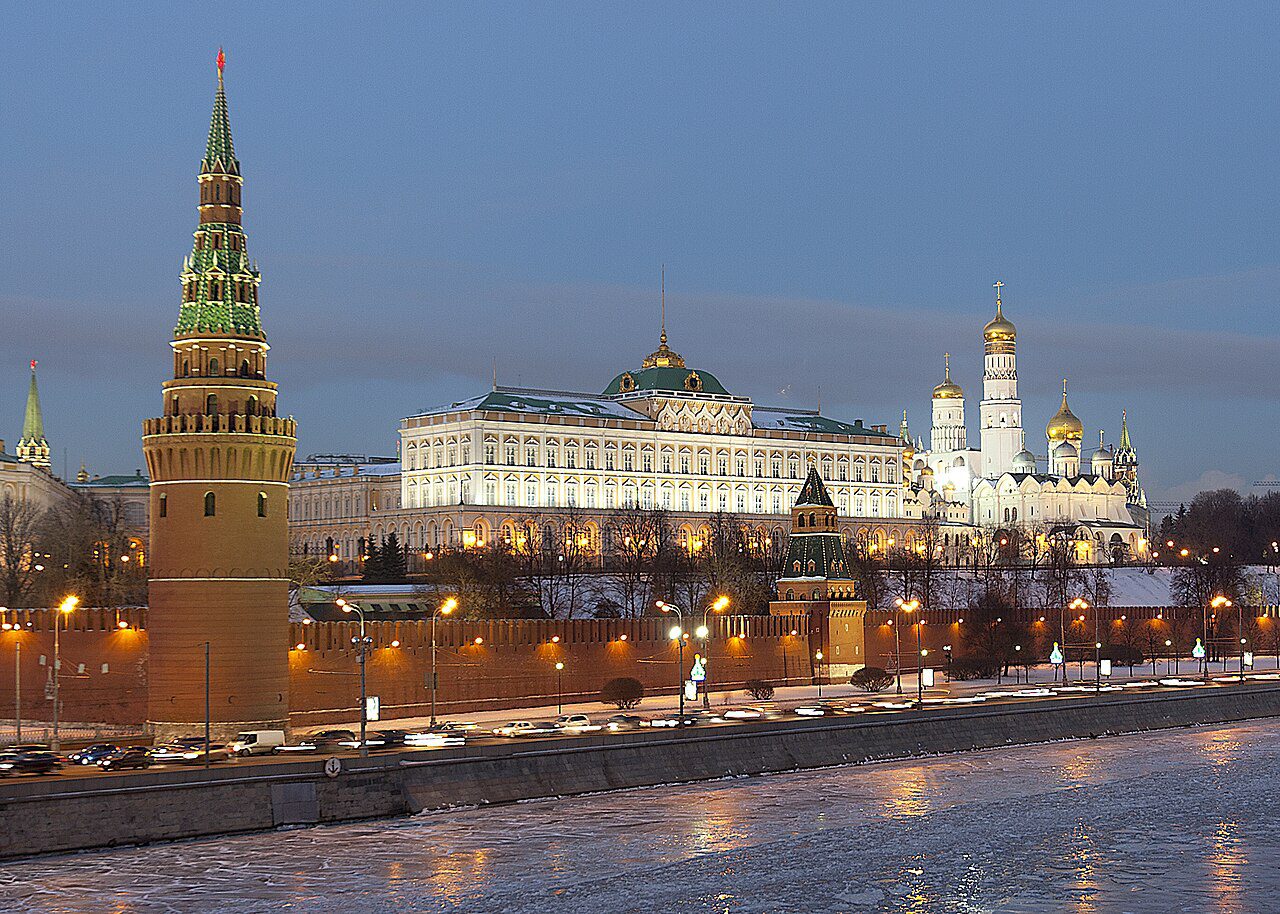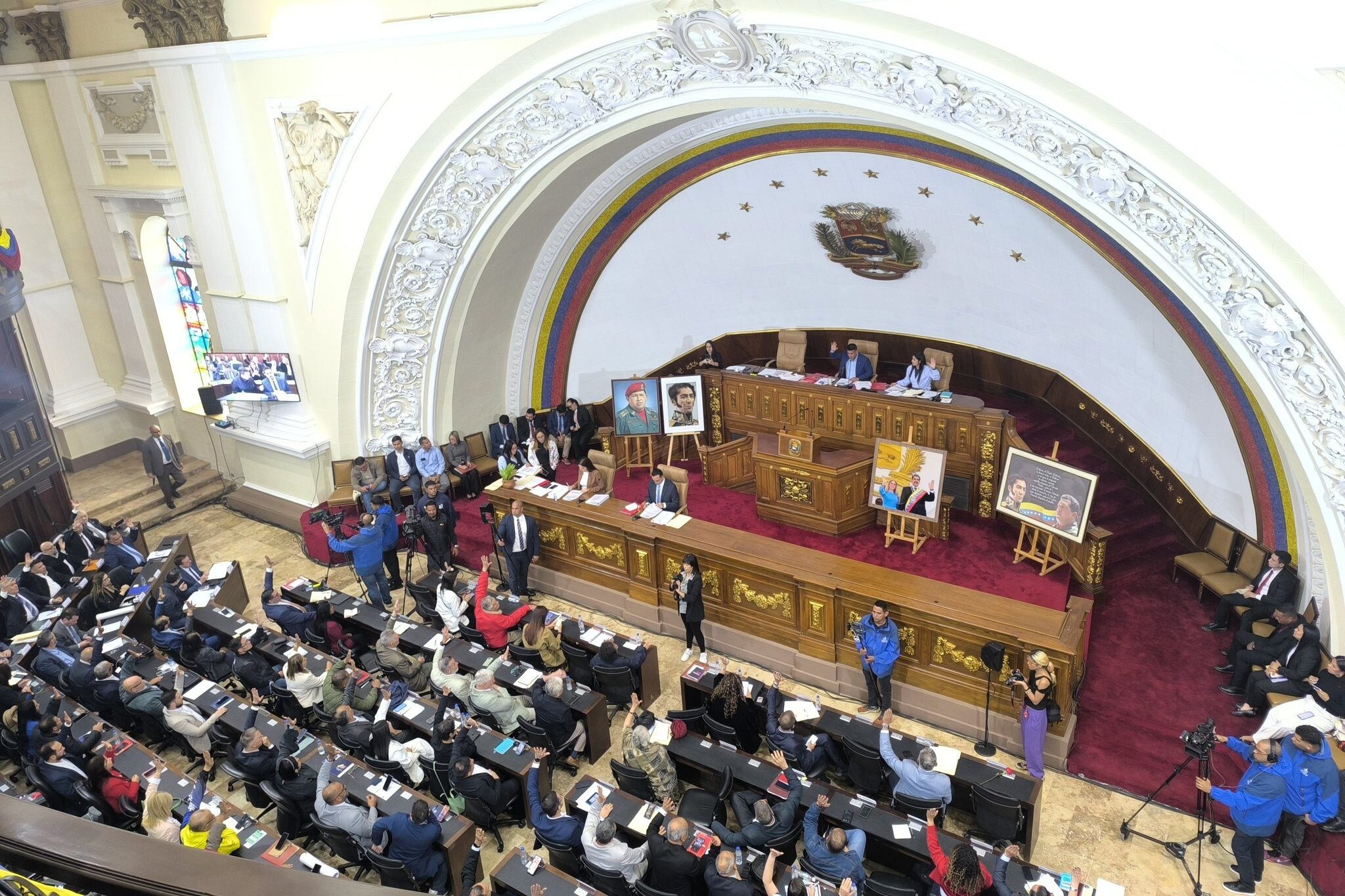Then President of the U.S. Joe Biden with his senior advisor for Latin America, Juan González. Photo: Juan González.
Guacamaya, April 6, 2025. Juan González was the White House National Security Council Senior Director for the Western Hemisphere in the Biden administration, from January 2021 until March 2024. He led a fundamental change in U.S. policy towards Venezuela, prioritizing strategic engagement to advance U.S. interests, after the failure of the first Trump administration to cause regime change with a “maximum pressure” strategy.
González was involved in talks with the government of Nicolás Maduro, which involved visits to Caracas to free American prisoners and secret negotiations in Doha, Qatar. There are plenty of myths about what was said and done. At Guacamaya, we ask González about these high-level discussions, sanctions, the so-called “Chevron license,” what went right, what went wrong, and why it went wrong.
Question: You had a role in discussions with the Maduro government under President Joe Biden. What did your role entail? What did you have to do regarding Venezuela?
Answer: Despite popular perception, I was not single-handedly running Venezuela policy from the White House. As Special Assistant to the President and Director for the Western Hemisphere at the National Security Council, my role was to advise the President, Vice President, and National Security Advisor, and to oversee implementation of the President’s policy directives. That included chairing the Interagency Policy Committee for the Western Hemisphere, which brought together all relevant departments and agencies.
On Venezuela, we established a small, senior-level working group that included representatives from the Departments of State and Treasury, as well as other key agencies, to craft a proposed negotiating strategy. That strategy was reviewed through formal interagency processes—by Deputies, Principals, and ultimately by the President. We also maintained close coordination with the Hill, consulting Senator Bob Menendez, then-Chairman of the Senate Foreign Relations Committee, prior to each engagement and providing full readouts afterward to inform his oversight and solicit feedback.
“What we encountered in 2021 was a more entrenched Maduro regime that had adapted to U.S. sanctions and a regional diplomatic environment where U.S. leadership had been badly eroded.”
Q: Trump has said that when he left office, “we had Venezuela on the run, Maduro was ready to leave.” Is this the situation that you encountered in 2021?
A: No. What we encountered in 2021 was a more entrenched Maduro regime that had adapted to U.S. sanctions and a regional diplomatic environment where U.S. leadership had been badly eroded. Countries that had joined the Lima Group in 2017 did so under the belief that the United States had a coherent strategy. By the time we took office, it was clear to the region that Trump’s Venezuela policy was being driven by domestic politics in South Florida, not a serious plan to restore democracy.
The Trump administration’s ‘maximum pressure’ sanctions campaign failed to produce results. After the sanctions’ peak impact in 2019, the regime quickly adapted. We were seeing sanctioned Iranian tankers moving Venezuelan oil, transshipping through Malaysia, and ultimately selling it to China at a $40-per-barrel discount from Brent crude. Sanctions have diminishing returns—the more you use them, the harder it becomes to find new targets. Treasury’s Office of Foreign Assets Control had an increasingly difficult time identifying meaningful sanctions that hadn’t already been imposed.
Any sanctions expert will tell you: sanctions rarely topple regimes, but they can help shape behavior. The Trump administration bet everything on collapse without any diplomatic or mediation effort to go with it. That approach failed—spectacularly.
Q: The Biden administration started talks with the Maduro government in 2022, just as Russia had invaded Ukraine. Energy prices were skyrocketing, and Europe was trying to wean off Russian oil and gas. Is that correct? Or did talks start for another reason?
A: You’re referring to the March 2022 trip to Caracas that I made with Special Envoy for Hostage Affairs Roger Carstens and U.S. Ambassador Jimmy Story. That visit was not about oil—it was about bringing Americans home. Roger believed we had a chance to secure the release of unjustly detained Americans if I joined him, given my role at the White House. Because it would be the first official White House visit to Caracas since 1998, we took the decision directly to President Biden. We laid out the potential political backlash if the visit became public. His only concern was whether it could help bring Americans home, so we went.
Critics later accused us of trading oil sanctions relief for hostages, but that’s simply false. In the meeting with Maduro, I asked him to release the Americans as a gesture of good faith in response to our visit. I made clear that the channel to the White House would close if no action was taken within 48 hours. At the same time, we communicated our openness to a broader discussion about the bilateral relationship, with a clear focus on democratic restoration. Within two days, the regime reciprocated by releasing Gustavo Cárdenas and Jorge Alberto Fernández.
The first formal round of negotiations didn’t happen until May 2023, and the focus then was not oil—Venezuelan production simply isn’t large enough to move global energy markets—but the upcoming presidential election and the conditions necessary for a credible vote.

Q: On this, what were the first topics that were discussed between the two governments? Hostages? Oil sanctions? Debt? A democratic transition?
A: I won’t get into the specifics of the negotiations, but I can say this: we did not negotiate the future of Venezuelan democracy. That was—and remains—the role of the Unitary Platform. From the outset, we made clear that the opposition should lead on defining the political terms of a democratic transition. Our job was to create the international conditions that could support that process.
We consulted closely with the Unitary Platform to understand what they saw as meaningful progress—or setbacks—in the lead-up to the 2024 elections. Those inputs shaped our entire negotiating strategy. When we engaged with Maduro’s representatives, the core focus was on the sequencing and timing of concrete steps—electoral guarantees, legal reforms, timelines. Sanctions relief was structured around those steps.
Importantly, we did not negotiate sanctions policy with the Unitary Platform. That was both to protect them and because decisions about U.S. sanctions rest solely with the United States. That said, there were times when they disagreed with how we timed or calibrated specific sanctions actions.
I also want to clarify the decision to lift sanctions on Erik Malpica. That idea was first raised by the opposition itself—to Ambassador Jimmy Story—and later discussed in a breakfast I had with Leopoldo López and Carlos Vecchio, who expressed support. So yes, I was surprised when they later criticized the decision publicly. But the record is clear.
“Venezuela was still exporting oil—primarily to China—but doing so off the books and at a steep discount. The Maduro government had adapted, and the black market was thriving.“
Q: What is the Chevron license? What was the point? Why did the Biden administration do it?
A: I can’t speak to the specifics of a specific license, which are treated as proprietary—unlike General Licenses, which are publicly available. But I can share the broader rationale.
As I mentioned earlier, U.S. sanctions had reached diminishing returns. Venezuela was still exporting oil—primarily to China—but doing so off the books and at a steep discount. The Maduro government had adapted, and the black market was thriving.
The Chevron license was a strategic decision. It allowed us to bring Venezuelan oil out of the shadows, put it under U.S. jurisdiction, and direct production through an American company subject to U.S. compliance and oversight. Importantly, the structure ensured that profits would not go to the Maduro regime but instead be used to repay Venezuela’s outstanding debt to Chevron. An added benefit was the injection of hard currency into the formal economy, which helped to stabilize and rebuild elements of the Venezuelan private sector – a stakeholder that we wanted to empower to advocate for the government to make additional concessions in exchange for further relief from sanctions.
Contrary to some reporting—including by Bloomberg—there was no secret deal. Chevron was already authorized to pay taxes and royalties under General License 35, which is public. General License 41 simply clarified that any payments not explicitly authorized under that license were already covered under GL35. The goal was to allow only those payments—taxes and royalties—while Chevron recovered its debt.
This was not a backroom arrangement. It was a transparent, deliberate policy decision aimed at creating incentives for more lawful economic activity inside Venezuela while maintaining pressure for democratic reform.
“The only clear winner here is China.“
Q: What do you expect will be the main results now that the Chevron license is gone? More pressure on Maduro to negotiate or the opposite? Will it affect migration flows to the U.S.?
A: The only clear winner here is China. Now that Chevron has helped stabilize and even increase Venezuelan production, Beijing will step in to buy more oil—at a discount, off the books, and without any of the compliance or transparency requirements Chevron was subject to.
As for pressure on Maduro, this move actually weakens U.S. leverage. Sanctions without a diplomatic strategy don’t generate negotiation—they create a vacuum. And that vacuum is already being filled by other actors with very different interests.
Emigration from Venezuela will likely continue—including to the United States—despite this administration’s best efforts to terrorize migrants.
I think we need to be honest about the role that sanctions have played in this crisis. There’s no question that the broad sanctions imposed in 2019, especially those targeting the oil sector, contributed to the acceleration of migration. Venezuela was already in deep decline due to corruption and authoritarian mismanagement, but cutting off its primary source of revenue made it even harder for the state to import food and medicine or maintain basic public services.
The timeline speaks for itself. The largest surges in migration came after 2017, and especially after the 2019 sanctions took effect. More than 7 million Venezuelans have now fled the country. That’s not coincidental—that’s what happens when you combine authoritarian collapse with economic isolation and no viable off-ramp.
To be clear, sanctions can be a useful tool, but they are not a strategy. They don’t topple regimes on their own. The Trump administration’s approach seemed to assume that increasing humanitarian suffering would lead the population to overthrow the government. But that’s not what happened – people simply left.
“The Chevron license was fundamentally in the national security interest of the United States.”
Q: After the talks that led to the Chevron license, the Biden administration then moved on to negotiations in Qatar and Barbados. What was agreed there on general lines?
A: The Chevron license was fundamentally in the national security interest of the United States, but it had the added benefit of helping to lay the groundwork for negotiations.
Again, our role as a member of the international community was to create an enabling environment for the conduct of equitable and inclusive elections. The issuance of General License 44 (GL44) which lifted all sanctions on the oil and gas sector but did not allow for new investments, was tied to a number of metrics, most importantly allowing the opposition to conduct its own primary where it selected its own presidential candidate. We had lined up another General License that would have lifted all sanctions on the Venezuelan financial sector once the government announced the electoral calendar and allowed the winner of the opposition primary to register as a presidential candidate.
The reason we decided to issue a public General License and not a series of private licenses was to send a loud message to all of Venezuelan society that the United States was prepared to take big steps in response to equivalent steps by the government and ultimately respect the results of the election. We knew that the GL44 would not be a panacea, because oil and gas companies would sit on the sidelines until they had some degree of certainty that sanctions would not be reimposed. The government did allow Maria Corina Machado, the winner of the opposition primary, to appeal her prohibition from running for elected office, but it ultimately upheld the prohibition, so we pulled GL44.
Q: Why would you say that the Qatar and Barbados deals failed? In the end, we had renewed sanctions—GL 44 ended—and the elections were deemed undemocratic according to independent observers, like the Carter Center and the United Nations mission.
A: Some elements of the Barbados agreement were implemented, but the ultimate result was a presidential election that fell far short of international democratic standards. Independent observers were clear in that assessments.
From the outset, we were under no illusions. We knew the Maduro government was unlikely to allow a presidential contest it couldn’t control—especially in the absence of enforceable political guarantees. That skepticism was not private; it was publicly expressed by U.S. officials, including Assistant Secretary Brian Nichols in congressional testimony. But we also understood that the policy we inherited—maximum pressure without a diplomatic track—was not producing results. We had to try a different approach.
I think the Unitary Platform understood that as well. Much of our engagement centered on how to use the presidential elections as a lever—not because we believed they would be free and fair, but because they could be used to elevate the standard for future elections. The hope was to establish a trajectory that would make inclusive and competitive municipal elections in 2025 more achievable.
Where our approach did succeed was in aligning governments across the political spectrum in Latin America and the Caribbean around a common democratic framework for Venezuela—and in exposing the Maduro government’s manipulation of the electoral process. Had we simply continued the Trump administration’s hardline posture without a diplomatic track, the United States would have been increasingly isolated. Regional partners facing intense pressure from Venezuelan migration were already urging Washington to ease sanctions, with or without democratic concessions. In that scenario, it’s hard to imagine the government allowing even an opposition primary to take place.
“[Trump’s approach] won’t work. The assumption that pressure alone will force Maduro from power has been tested and failed.”
Q: What do you think that the Trump administration’s strategy is now towards Venezuela? On one hand, it has removed protections to Venezuelan migrants and tried to resume deportation flights. On the other, it has removed sanctions waivers. Is there a coherent plan?
A: I keep looking for signs of a coherent strategy, but so far I see only a series of tactical moves—none of which account for the second- or third-order consequences they’re likely to generate. As with Trump 1.0, the focus appears to be on regime change at any cost. That approach has three fundamental flaws:
First, it won’t work. The assumption that pressure alone will force Maduro from power has been tested and failed.
Second, it risks further eroding U.S. influence in the hemisphere, alienating regional partners, and creating space for China, Russia, and Iran to deepen their strategic footprint in Venezuela and beyond.
And third, it rests on the flawed premise that Venezuela’s problems end the moment Maduro leaves office. They don’t. The collapse of institutions, the humanitarian crisis, and the loss of public trust won’t be resolved overnight—and certainly not without a viable transition plan that includes both international support and domestic consensus.
What’s needed is a policy that aligns our tools—diplomatic, economic, and humanitarian—with a realistic path to democratic restoration. Right now, I don’t see that from the Trump team.
Q: Should the US help democracy and economic stability in Venezuela? How could it help?
A: A democratic and economically stable Venezuela is a fundamental national security interest of the United States. There is, of course, a tension between the sense of urgency in the face of repression and the reality of what political transitions actually require. Venezuela has been under chavismo for nearly a quarter century. The idea that one round of negotiations or one flawed election would produce a clean democratic break was always unrealistic. When we look at other post-authoritarian transitions—whether in the former Soviet Union or in Latin America itself—we see how long, uneven, and dialogue-driven those processes tend to be. My native Colombia’s own experience is instructive: the polarization and violence that defined its political life prior to the National Front took decades to resolve, and even then, imperfectly.
The path forward in Venezuela won’t be short or linear. But disengagement won’t bring democracy any closer. What’s required is strategic persistence—clear-eyed about the challenges, grounded in principle, and willing to engage where it can move the needle.
The deeper challenge is that U.S. policy toward Venezuela—and Cuba, for that matter—is too often dictated by the politics of South Florida rather than by a sober assessment of U.S. national interests. That disconnect does a disservice to the Venezuelan people, who deserve a future of dignity and opportunity, and it weakens our position in a region where China, Russia, and Iran are more than ready to fill the void.


